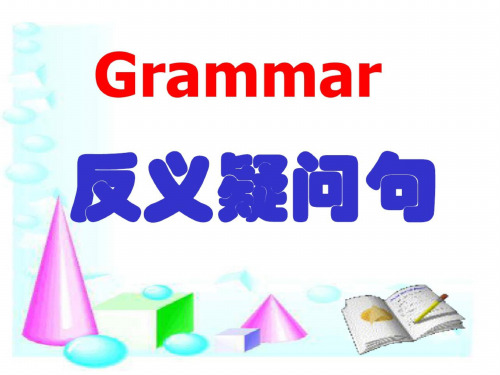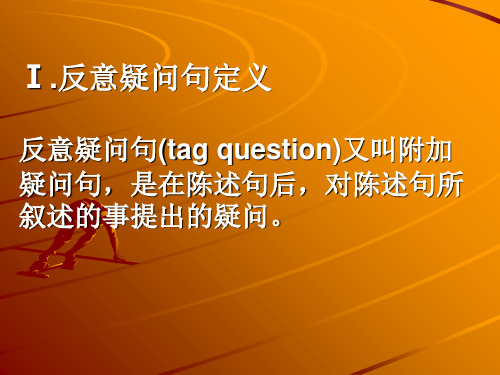初中英语反义疑问句精讲演示教学
初中反义疑问句详细讲解(总6页)

初中反义疑问句详细讲解-CAL-FENGHAI.-(YICAI)-Company One1-CAL-本页仅作为文档封面,使用请直接删除反义疑问句一、英文中的反意疑问句。
1、什么是反意疑问句英语中,反意疑问句是由陈述句和附在其后的附加疑问句组成。
其中附加疑问句是对陈述句所说的事实或观点提出疑问,起证实作用,一般用于证实说话者所说的事实或观点。
翻译为“是吗”2.反意疑问句的回答,回答时,如果情况属实,用Yes加上反问句的倒装肯定句;若果情况不属实,则用No加上反问句的倒装否定句。
例如You were moved by your students, weren’t you情况属实:Yes, I were.情况不属实:No, I weren’t.二、反意疑问句中问句部分的动词与陈述部分的动词在语气上成相反的对应关系,即:肯定+否定否定+肯定如:①You can’t do it, can you 你不能做它,是吗②They are very late for the meeting, aren’t they 他们开会迟到了,是吗三.当陈述句中含有be动词,助动词,或是情态动词时,反问句部分由这些词加上主语人称代词构成,Be动词包括:am, is, are, was, were助动词有:do, does, did, have(用在完成时), has(用在完成时)等情态动词有:can, could, may, might, must, will, would, shall, should例如:She is a lovely girl, isn’t she?He will go home, __won’t__ __he__She doesn’t l ike to eat popcorn, __does__ _she___The baby won’t sleep early, will it注意:①He has supper at home every day,doesn’t’t he(不能用hasn’t he)②They have known the matter, haven’t they(不能用don’t they)四.当陈述句中只含有行为动词时,若动词加了s,就用does, 若动词为原形,就用do,动词为过去式,则用did,例如:You cleaned your house last week, _didn’t___ __you__Your father plays the computer very well, __doesn’t__ ___he _They look so happy today, _don’t ___ _they___五.反意疑问句的陈述部分带有little, few, never, hardly, seldom,nobody, nothing, barely, scarcely等否定意义的词时,问句部分用肯定式。
九年级英语反义疑问句课件1

视频如何去声音 把视频声音去除、视频配音配音 好看视频如何下载视频到本地1、手机中,打开好看软件 2、点击要下载的下方的“...”符号 3、底部就会出现一些选项,点击“下载” 4、随后点击右下角“我的” 5、再点击“下载”栏目 6、下载栏目中就能看到下载的点击右侧的“...”符号 7、再点击“保存本地”就可以保存到本地相册了 8、总结 1、好看app中,点击下方的“...”符号,然后点击下载 2、点击右下角“我的”,再点击“下载”,这里能看到点击了下载的3、继续点击下载右侧的“...”符号,点击“保存到本地”即可保存到本地相册
视频如何去声音 把视频声音去除、视频配音配音1、 消音效果的功能在“配音配乐”,点击配音配乐: 2、 点击“添加”,在“打开”界面选择准备好的文件,点击“打开”把需要进行消音处理的文件添加进来。这里每次只能添加一个文件。 3、 点击“下一步”: 4、 勾选了“消除原音”后,我们点击下一步。(配音配乐功能也在这个界面,主要还是消音操作,所以只在最后两步给大家说明下怎么配音配乐) 5、 在“输出目录”这一栏点击按钮选择消音后的文件存放位置,再输入消音后的文件名,点击保存即可。(可以勾选显示详细设置进行音参数设置) 6、 耐心等待完成。点击“确定”后,点击“打开输出文件”,这个时候就可以看到消音后的文件了。 7、 简单说下配乐。在上面“消除原音”的那一步操作中,界面左下方有“新增配乐”按钮,点击选择想要添加的配乐,支持添加多首配乐。拖动音乐段的左右两边可以调整配乐开始及结束时间。 8、 另外可以给配音。在上一步操作界面中,点击配乐旁边的“配音”,点击“新配音”开始录制配音,再点击“停止录制”即可停止这一段的配音录制。当然,你也可以在不同时间点录制不同的配音
反意疑问句课件

19)否定前缀不能视为否定词, 其反意疑问句仍用否定形式。
It is impossible, isn't it?
He is not unkind to his classmates, is he?
6. 反义疑问句的回答用yes,no 但是,当陈述部分是否定形式时, 回答要按事实。 They don’t work hard, do they? Yes, they do.
Nobody will go, will they?
16)带情态动词dare或need的反 意疑问句,疑问部分常用 need (dare ) +主语。
We need not do it again, need we ? He dare not say so, dare you?
当dare, need 为实义动词时, 疑问部分用助动词 do + 主语。
3)陈述部分用 no, nothing, nobody, never, few, seldom, hardly, rarely, little等否定含义 的词时,疑问部分用肯定含义。
The Swede made no answer, did he / she? Some plants never blown (开 花), do they ?
Let us 开头的祈使句,后 用will you?
Let's go and listen to the music, shall we? Let us wait for you in the reading-room, will you ?
Let’s go fishing, _s_h_a_l_l _w_e? Let us do this job,_w__il_l _y_o_u? Turn on the radio,w__il_l_y_o_u_?
九年级英语反义疑问句课件1

姐姐到新疆拾棉花,前后去了三次。但在第三次,姐姐到了新疆在棉田里待了半晌,家里就接到包工头的电话,说姐姐像是去看望姐姐的,已经五年未见。第二天,我曾在微信上写了这样的句子:“姐姐的八岁/她的童年抱着/我,那年秋天雨注四十二天/我的脐带渗血四十二天/姐姐的六十二 岁/她抱着/五岁的孙女/姐姐十五岁/拉载重一千八百斤的地排车/车上有时是四到六个三百五十斤重的汽油桶/有时是八到十个两百斤重的粮食麻袋/姐姐三十岁/和村中恶男骂仗/后从家中取出刨红薯的铁 抓钩/一下砸折恶男腿骨/乡间为之侧目/姐姐五十五岁后/三到新疆拾棉花/坐绿皮火车两次/坐大巴一次/历三个昼夜,姐说/在火车上人挤如集上卖的猪秧子(猪崽)/最后一次去新疆拾棉花/只一天,她就晕 倒在棉田里/二外甥坐飞机去接她/姐姐平生第一次坐上了飞机/这一次把她前两次拾棉的钱都/赔进去了/昨天,去看姐姐/她停下喝了几十年的酒/茶也不喝了/改成喝蒲公英/外甥和我喝五粮液/姐姐说,好 酒,我也尝一口”。
人教版八年级英语下册unit 10 反义疑问句的用法 课件(共32张PPT)

代词.
There is something
wrong
with
the
TV,_i_s_n_’__t__t_e?re
There won’t be any meeting next weekw,_i_ll__th__e_r_e_?
6.陈述部分主语是 everyone, everybody, someone, somebody, anybody, no one, nobody等时,疑问部分用 they, he; 陈述部分是everything, something, nothing, anything 时,疑问部分用 it
8. She had to get there early ,_d_i_d_n_’__t_s_h_e? 9. Mary can’t ride a bike ,_c_a_n__s_h_e____? 10. There is some milk in the glass ,
is_n_’__t__t_h_e_re? 11. There were few students in the room ,
He never said he was a good student, did he? I don’t think you are right, are you? I don’t believe he studies harder, does he?
各种时态的反义疑问句。
1.Lily likes going shopping, _d_o_e_sn_’__t__sh_?e 2.They aren’t students,a_re__th__ey____? 3.You’re going to the cinemaa,_r_e_n_’__t _y_o_u_? 4.She isn’t waiting for me,i_s_s_h_e___? 5.They have been to Singapore, h__a_v_en__’__t ?th
中考英语-反义疑问句PPT(共46张PPT)

A.目的:我们使用反义疑问句来确认某件事是否是真实的, 或者期望得到对方的肯定回答。
B.构成:陈述部分+附加疑问部分
C.规则: 1.附加疑问部分构成: 由谓语动词的正确形式(be,do ,情态动词)+主格代词 (he,they,it等) 2.时态 陈述部分与附加疑问部分时态保持一致
3) 关于陈述部分的主语和疑问 部分的主语一致问题
陈述部分主语
不定代词everyone,no one, nobody everything,anything,nothing,som ething, this,that one
疑问部 分主语
he/they
it one/he
例句
Everyone is in the classroom, aren't they? Everything goes well, does it? This is your book, isn't it? One can't be always young,can one?
now,_________? 4.It's a nice day,______? 5.Arthur is responsible for the newspaper, ____? 6.Alice has never seen a three-D movie at the cinema,
_______?
动词 + there
There are some apples in the basket, aren't there? There isn't any milk left, is there?
英语反义疑问句PPT课件

2.Let me help you , will you ?
3.Let us go home now , will you ?
4.Let’s go home now , shall we ?
.
24
(6)陈述句主语everything, something anything,nothing表物的不定代词时, 反意疑问部分主语应用it。如:
can they ?
.
19
(3)陈述句部分出现 few,little, hardly(几乎不)等,虽不是否定词,但 表示否定意义的词时,反意疑问部 分应用肯定形式。如: There is little rice in the bowl,is there? 碗里几乎没有米饭,是吗? You can hardly understand it,can you? 你几乎不能理解这一点,是吗?
.
17
(2)陈述句部分出现no, nobody, never, none,neither等 表示否定意义的词时,反意疑问部 分应用肯定形式。如: There is no rice in the bowl, is there?碗 里几乎没有米饭,是吗?
You can understand nothing, can you? 你几乎不能理解这一点,是吗?
Yes, they .are.
11
The girl is crying, isn’t she? Yes , she is .
The girl isn’t crying, is she ?
Yes , she is.
The girl isn’t laughing, is she ?
No. ,she isn’t
.
反义疑问句详细讲解课件(PPT27张)

Kate has to help her mother at home,doesn’t she?
3) have表示“吃,喝,玩,度过”等意 思时,其附加问句的谓语应用助动词do.
They had a good time in Beijing ,didn’t they?
Ⅰ.反意疑问句定义
反意疑问句(tag question)又叫附加 疑问句,是在陈述句后,对陈述句所 叙述的事提出的疑问。
Ⅱ.基本结构:
陈述句+逗号+简短的一般疑问句?
遵循前肯定后否定前否后肯式的原则
①前肯后否式。例如:
You are all students, aren’t you﹖
②前否后肯式。例如:
[误] Tom can speak Chinese well, can’t Tom﹖
[正] Tom can speak Chinese well, can’t he﹖
一般现在时:
Lily likes going shopping, d_o_e_s_n__’t_she? They aren’t students, __a_r_e___
You must have seen the film last week, didn’t you?
6. 当陈述部分是I am…时,反意疑 问句部分通常要用aren’t I;如陈述 句部分的主语是I am not时,反意疑 问句部分通常要用am I。 例如:
1)I am a teacher, aren’t I?
The End
They must come on time,needn’t they?
2)must表示推测,“一定,想必”之意,附加问 句的谓语动词的确定应根据must后面的动词。
- 1、下载文档前请自行甄别文档内容的完整性,平台不提供额外的编辑、内容补充、找答案等附加服务。
- 2、"仅部分预览"的文档,不可在线预览部分如存在完整性等问题,可反馈申请退款(可完整预览的文档不适用该条件!)。
- 3、如文档侵犯您的权益,请联系客服反馈,我们会尽快为您处理(人工客服工作时间:9:00-18:30)。
反义疑问句反义疑问句(The Disjunctive Question) 即附加疑问句。
它表示提问人的看法,没有把握,需要对方证实。
反义疑问句由两部分组成:前一部分是一个陈述句,后一部分是一个简短的疑问句,两部分的人称时态应保持一致。
主语一般词语附加疑问句中主语用和主语一致的主语,用主格。
不定代词当陈述部分的主语是(1)everyone,no one,nobody 等时,后面的疑问句应表示为:Everyone is in the classroom, aren't they? (基本不用单数,但也可用he)Nobody will go, will they?(2) everything,anything,nothing,something时,附加疑问句中主语一般用it 不用they(3)this,that,或those,these时,附加疑问句中主语用it和they.特殊句型(1)当陈述部分有never,seldom, hardly,few,little,barely, scarcely, nothing 等否定意义的词时,后面的反意疑问句则为肯定形式:There are few apples in the basket, are there?He can hardly swim, can he?They seldom come late, do they?(2)当陈述部分含有否定意思的词是unhappy,dislike,unfriendly等含有否定词缀的派生词,也就是有un-前缀、-less后缀等含有词缀而意思否定的词,当做肯定句处理,疑问部分要用否定形式。
如:He looks unhappy,doesn't he?他看上去不高兴,不是吗?The girl dislikes history,doesn't she?这女孩不喜欢历史,不是吗?含有think, believe, suppose, imagine, expect等动词后接宾语从句构成的主从复合句在构成反意疑问句时,视情况不同有两种不同的构成方式。
(1) 当主句的主语为第一人称时,其后的简短问句应与从句相一致。
例如:I expect our English teacher will be back this weekend, won't she/he?We suppose you have finished the project, haven't you?值得注意的是,当这些动词后接的宾语从句的否定转移到主句时,其仍属否定句,故其后的简短问句应用肯定式,而非否定式。
例如:I don't believe that he can translate this book, can he?Wedon't imagine the twins have arrived, have they?此类句子的回答同"前否后肯"型反意疑问句一样,如上述后一个句子,若双胞胎已经到了,则回答为"Yes, they have.";若尚未到达,使用"No, they haven't."。
(2) 当主句的主语为第二、三人称时,其后的简短问句则应与主句相一致(此时,否定只看主句,与从句无关...)。
例如:Your sister supposes she needs no help, doesn't she?You thought they could have completed the project, didn't you?They don't believe she's an engineer, do they?She doesn't expect that we are coming so soon, does she?(3)但如果主句的时态是过去时等等,疑问句应和主句的人称时态保持一致。
陈述部分有had better,或其中的have表示完成时态时,疑问句应用hadn’t等开头:You’d better get up early, hadn’t you?其他情况句中有have时疑问句应用don't等开头如have表示“有”的时候,有两种形式:-He has two sisters,doesn't he?-He doesn't have any sisters,does he?当陈述部分是祈使句时,疑问句要根据语气来表达当开头是Let‘s时,一定要用shall we。
其余都用will you(包括Let us)不论肯定否定Let’s go out for a walk, shall we?Let us go out for a walk, will you?Let me help you,may I?Turn on the radio, will you?There be 句型中,反义疑问部分必须为be 动词+ thereThere are some apples in the basket, aren't there?There isn't any milk left, is there?当陈述部分有情态动词must,问句有4种情况:(1)mustn't表示“禁止,不可,不必”时,附加问句通常要用must.You mustn't stop your car here,must you? 你不能把车停在这地方,知道吗?(2)must表示“有必要”时,附加问句通常要用needn't.They must finish the work today,needn't they?他们今天要完成这项工作,是吗?(3)当must用来表示对现在的情况进行推测时,问句通常要根据must后面的动词采用相应的形式。
He must be good at English,isn't he? 他英语一定学得很好,是吗?(4)当must+have done表示对过去的情况进行推测(一般句中有明确的过去时间状语),问句要根据陈述部分谓语的情况用“didn't+主语”或“wasn't/weren't+主语”;如果强调动作的完成(一般没有明确的过去时间状语),问句要用“haven't/hasn't+主语”。
She must have read the novel last week,didn't she?她上星期一定读了这本小说,是吗?You must have told her about it,haven't you? 你一定把这事告诉她了,是吗?回答反意疑问句的回答用yes,no,但是,回答意思相反,当陈述部分是否定形式时,回答要按事实。
如:They don’t work hard, do they? 他们不太努力工作,是吗?Yes, they do. 不,他们工作努力。
/No, they don’t. 对,他们工作不努力当陈述部分为否定式,反意疑问句为肯定式时,其回答往往与汉语不一致,需特别引起注意:"It isn’t cheap, is it?" "Yes, it is." “它不便宜吧?”“不,很便宜。
”"He doesn’t love her, does he?" "No, he doesn’t."“他不爱她,是吗?”“是的,他不爱她。
”此时,"Yes"即不,对前面"It isn't cheap."的否定。
当陈述部分为肯定式,反意疑问句为否定式时,其回答一般不会造成困难,一般只需照情况回答即可:"It’s new, isn’t it?" "Yes, it is." “是新的,对吗?”“对,是新的。
”"He wants to go, doesn’t he?" "No, he doesn’t."“他想去,对吗?”“不,他不想去。
”此时,"No"即是,对前面"It's new."的肯定。
回答反意疑问句通常应根据实际情况来确定,“It is a beautiful flower,isn't it?” “It isn't a beautiful flower,is it?”肯定均为“Yes,it is."否定为“No,it isn't."快速记忆表I aren't IWish may +主语no,nothing,nobody,never, few, seldom, hardly, 肯定含义rarely, little等否定含义的词ought to(肯定的)shouldn't/ oughtn't +主语have to+v.(had to+v.) don't +主语(didn't +主语) used to didn't +主语或usedn't +主语had better + v. hadn't youwould rather + v. wouldn't +主语you'd like to + v. wouldn't +主语must 根据实际情况而定感叹句中be +主语Neither…nor, either…or 连接的并列主语根据其实际逻辑意义而定指示代词或不定代词everything,that, nothing,this 主语用it并列复合句谓语根据邻近从句的谓语而定定语从句,宾语从句的主从复合句根据主句的谓语而定think,believe,expect, suppose,imagine等引导与宾语从句相对应的从句everybody,anyone, somebody,nobody,no one 复数they, 单数he情态动词dare或need need (dare ) +主语dare, need 为实义动词do +主语省去主语的祈使句will you?Let's 开头的祈使句Shall we?Let us 开头的祈使句Will you?there be 相应的谓语动词+there(省略主语代词)否定前缀不能视为否定词仍用否定形式must表"推测根据其推测的情况来确定反意疑问句练习一、单项选择1、Few of them hurt themselves in the accident last night,________A. don’t theyB. didn’t theyC. did theyD. do they2、-You’ve never seen dinosaur eggs, have you ?--_____. How I wish to visit the Dinosaur World.A. Yes, I haveB. No, I haven’tC. Certainly, I haveD. Of course, I haven’t3、His sister had a bad cough, ______she?A. wasn’tB. doesn’tC. hadn’tD. didn’t4、Mr. Green went to Shenzhen on business last week,________?A. isn’t heB. doesn’t heC. didn’t heD. hasn’t he5、John can hardly understand any Chinese, _________he?A. Can’tB. doesn’tC. canD. does6、Don’t smoke in the meeting-room,_________?A. do youB. will youC. can youD. could you7、Lucy, you clean the blackboard today,_______A. do youB. did youC. will youD. can you8、Miss Cheng will never forget her first visit to Canada ,________?A. will sheB. won’t sheC. isn’t sheD. wasn’t she9、The lady couldn’t say a word when she saw the snake,________?A. could the ladyB. couldn’t the ladyC. could sheD. couldn’t she10、----________sweater is this?----I think it’s Peter’s.A. WhoB. WhatC. WhichD. Whose11、---______I go and meet you at the airport?---No ,thanks, dear . I can take a taxi home.A. WillB. DoC. ShallD. Should12、------_____is the Confucian Temple(孔庙) from here?------It’s about 10 minuters’ walk.A. How manyB. How longC. How muchD. How far13、-----______may I keep these book?-----two weeks.A. How oftenB. How farC. How longD. How soon14、Tina is unhappy now,________?A. isn’t sheB. is sheC. is heD.did she15、---_____you _____TV at the moment?----No ,you can turn it off.A. Did, watchB. Are ,watchingC. Do ,watchD. Have , watched16、----_____do you go to Hong Kong?----sorry , I’ve never been there.A. How longB. How oftenC. How farD. How soon17、A: ______you ever _____ the Great Wall?B: Only once.A. Did ,goB. Have , been toC. Have ,gone toD. Have ,been in18、----You lent me some money a few months ago.-----_____? I don’t remember lending you any money .A. Did IB. Did youC. Do ID. Do you19、----______is it from here to Yancheng Railway Station?----About two kilometers.A. How oftenB. How farC. How soonD. How long20、----Are you going to borrow a dictionary or a magazine?----______.A. Yes, a dictionaryB. No, a magazineC. A dictionaryD. Yes both21、My uncle has never been to a foreign country,_______?A. has heB. does heC. hasn’t heD. doesn’t he22、T here is some water in that bottle, isn’t _______A. thereB. itC. thatD.those23、----_______will the foreign students be back from NanJing.----In two days, I think .A. How soonB. How oftenC. How farD. How fast24、----Have you seen the film Return Of the King ?-----_______. I going to see it tonight.A. No , I didn’tB. Yes ,I doC. Yes ,I haveD. Not yet25、----John, will you please paint the door yellow?----__________?A. WhyB. What is itC. How is itD. How about26、---Let’s go and play football,__________?---That’s wonderful.A. will youB. do youC. won’t youD. shall we27、---The boy has to stay at home to look after his little sister,_______?---Yes, because his mother has gone shopping.A. does heB. is heC. doesn’t heD. hasn’t he28、---You won’t follow his example, will you ?---________________,I don’t think he is right.A. No, I won’tB. Yes, I willC. No, I willD. Yes, I won’t29、----____________?---The one behind the tree.A. Whose girlB. Who’s that girlC. Which girlD. Where’s the girl30、______the population of china?A. How manyB. How muchC. How’sD. What’s二、句型转换,根据要求改写句子。
